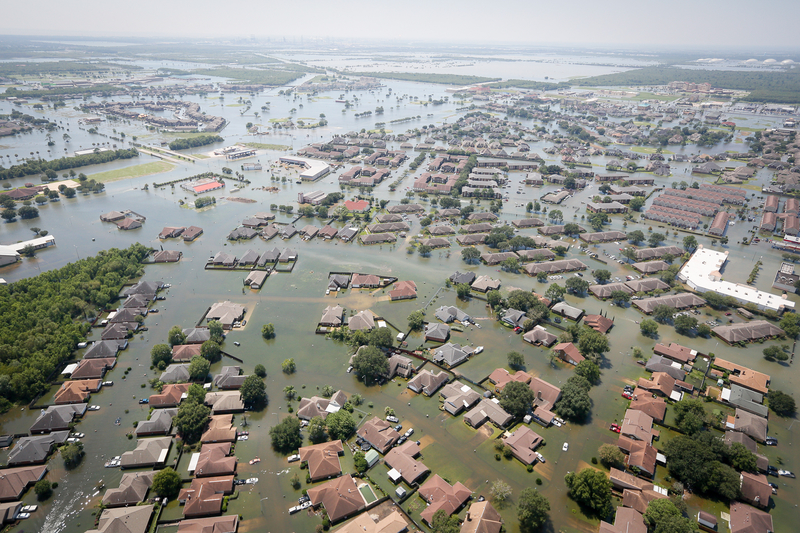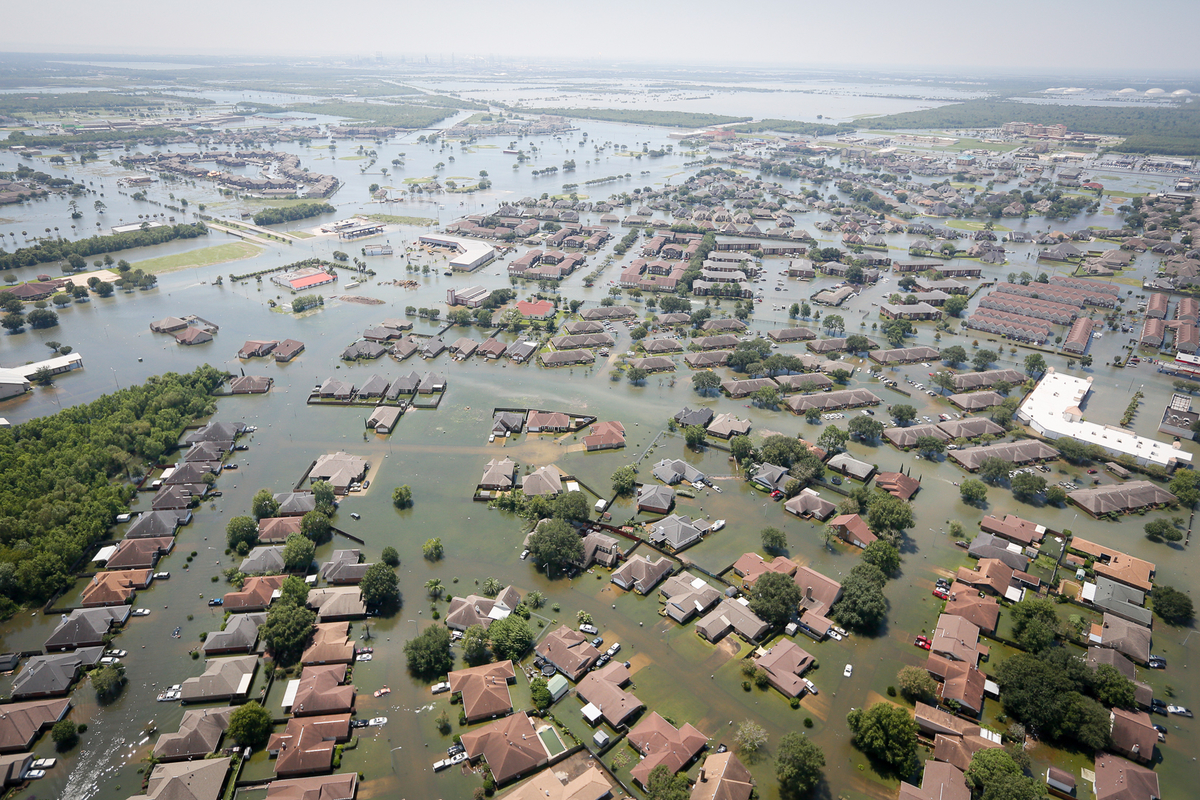This case study was co-written by Ruth Breech of RAN and Juan Parras, Founder and Director of Texas Environmental Justice Advocacy Services (TEJAS), for our latest bank report card, Banking on Climate Change: Fossil Fuel Finance Report Card 2018.

Rescue operations in Port Arthur, Texas, August 31, 2017. Photo by U.S. Air National Guard Staff Sgt. Daniel J. Martinez.
The torrential downpours and violent winds of Hurricane Harvey struck Houston, Texas in August and September 2017. Harvey killed at least 68 people1 and displaced over one million, leaving approximately 200,000 damaged homes along its 300-mile trail.2 Damages from the hurricane tallied an estimated $125 billion.3 The aftermath is still being felt through the region.
Environmental racism4 exacerbates the pain caused by natural disasters by disproportionately affecting low-income communities of color close to industrial sites. In the wake of Harvey, these communities were exposed to increased levels of toxic chemicals from Houston’s superfund sites, chemical plants, and oil refineries during the storms.5 Houston is an industrial hub with a busy ship channel, in a state that’s home to 30 percent of the country’s oil refining capacity.6 According to the Environmental Defense Fund, Hurricane Harvey caused damaged refineries and chemical facilities to release nearly six million pounds of cancer-causing chemicals into the air.7
Combining petrochemical production with hurricanes is a deadly mix, as seen by the Arkema plastics plant explosion during Hurricane Harvey. Harvey’s impact surpassed the most extreme scenario the plant had prepared for, and left it flooded with no way to prevent more serious fires.8
As the toxic waters receded, these communities — who for decades have faced long-term exposure to deadly pollution from the fossil fuel industry — found themselves also grappling with the effects of the extreme weather that this industry causes.
Moreover, many environmental justice communities cannot get assistance to face the damage wrought by these storms. In Houston, the city’s undocumented immigrant population of half a million people feared seeking help from shelters and public assistance.9 This serves as a reminder that climate change mitigation must be paired with a just recovery for all impacted by the symptoms of a warming climate, such as Hurricane Harvey.
As global temperatures increase, storms like Hurricanes Harvey, Katrina, Irma, Maria and Sandy will become even more intense. It can take decades for communities and municipalities to recover from these storms. The country pays a high price, both in human lives and in dollars, for the effects of climate change: the U.S. National Oceanic and Atmospheric Administration deemed 2017 the costliest year for weather disasters in U.S. history. The price tag was a staggering $306.2 billion, which broke 2005’s previous record of $214.8 billion.10
Even as the impacts of climate change become increasingly apparent, big banks poured $345 billion into climate-changing extreme fossil fuels from 2015 to 2017. If banks like China Construction Bank, RBC, JPMorgan Chase, and HSBC continue at these levels of financing for extreme fossil fuel projects and companies, they must reckon with their complicity in the increased social and economic impacts of climate change, which hit certain environmental justice communities “first and worst.”11
To learn more, follow TEJAS on Facebook and Twitter.
1. Eric S. Blake and David A. Zelinsky, “National Hurricane Center Tropical Cyclone Report: Hurricane Harvey,” ; NOAA and National Weather Service, 23 January 2018, p. 8.
2. Marianna Parraga and Gary McWilliams,“Funding Battle Looms as Texas Sees Harvey Damage at Up to $180 Billion,” Reuters, 3 September 2017.
3. “Fast Facts: Hurricane Costs,” NOAA Office for Coastal Management, last modified 18 January 2018.
4. “Environmental Racism,” Pollution Issues, accessed February 2018.
5. Troy Griggs et al., “More Than 40 Sites Released Hazardous Pollutants Because of Hurricane Harvey,” The New York Times, 8 September 2017.
6. “Number and Capacity of Operable Petroleum Refineries by PAD District and State as of January 1, 2017,” Energy Information Administration, 2017.
7. Rebecca Hersher, “Slow And Upbeat EPA Response To Hurricane Harvey Pollution Angers Residents,” NPR, 13 November 2017.
8. Bill Chappell and Merrit Kennedy, 31 August 2017. “Chemical Fire Burns At Flooded Arkema Plant In Crosby, Texas,” NPR, 31 August 2017.
9. Mari Sacchetti,“For Houston’s Many Undocumented Immigrants, Storm is Just the Latest Challenge,” The Washington Post, 28 August 2017.
10. “Fast Facts: Hurricane Costs,” NOAA Office for Coastal Management, last modified 18 January 2018.
11. Mary Hoff,“Robert Bullard: The Father of Environmental Justice,” Ensia, 12 June 2014.












